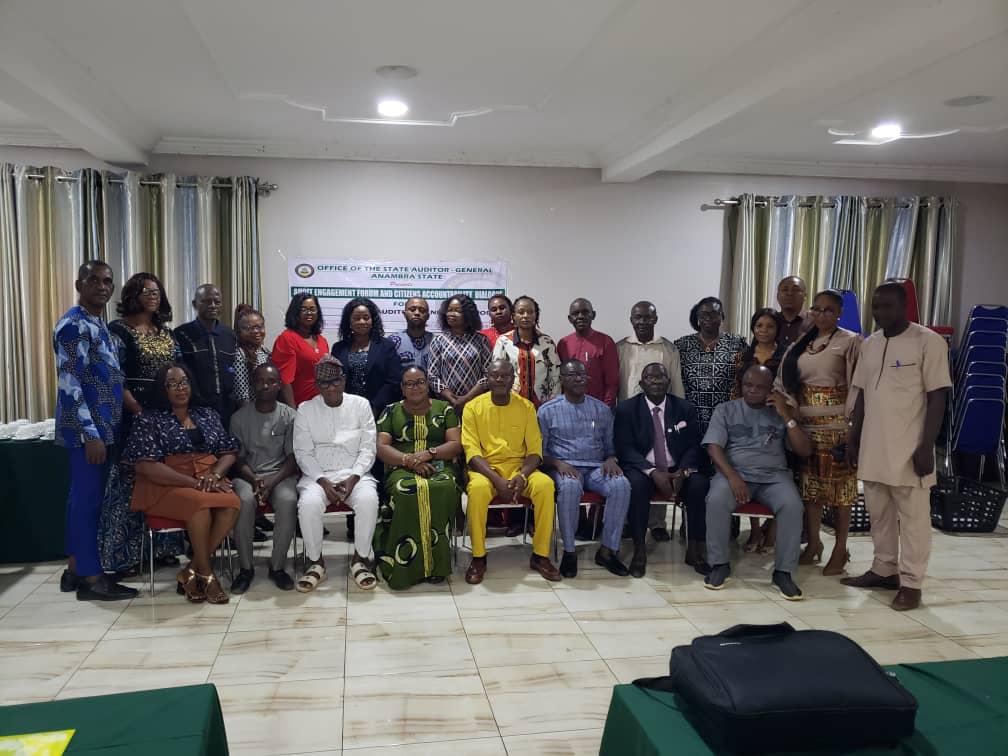Lawrence Nwimo, Awka
Anambra State Audit Report has made a shocking revelation that some Ministries, Departments and Agencies (MDAs), have failed to account for public funds entrusted in their care for about six years in the state.
The report which was presented at the 2024 audit forum and citizens accountability dialogue in Awka, Wednesday, also revealed that a total of 29 agencies in the state have not been audited since formation.
The event was organised by the office of the Auditor-General as part of activities marking the financial statements as required by international best practices.
Presenting the 2023 Audited Report, the State Auditor-General, Mr Akosa Charles Okocha, noted that six agencies were last audited in 2019, 2018, 2013 and 2012. He explained that some MDAs were yet to respond to audit queries even as some responses received from others have failed to address the key issues in line with extant laws of the land.
“Audit observed that most parastatals and State-owned statutory entities are not being audited as provided for in the 1999 constitution as amended and the laws establishing such entities.
“This breach is a serious affront on the constitution and state laws which should attract sanctions because the entities are operating ultra vires of their statutory mandate audit, casts doubt on their operation with regards to receiving funds from the state, collecting revenues and spending the fund.
“In the year under review, out of 50 statutory corporations and entities of the State, only 15 had their account audited up to 2021/2022 with some suit in progress. Six agencies were last audited in 2019, 2018, 2013 and 2012 while 29 agencies have not been audited since inception to date. This calls for serious attention as some of these agencies are carrying on their day to day businesses.
“Highlights on unresolved Audit issues raised in the 2023 Auditor-General report show that although some MDAs have replied and responded to the audit report forwarded to them pertaining to issues as contained in the audit report, my office is verifying the different responses and carrying out follow-up on the findings and observations,” he stated.
According to the report, MDAs faced issues ranging from improper record keeping, unretired and unaccounted funds appropriated and unappropriated, use of fictitious receipts, vouchers with insufficient retirement and improper documents to retire expenditures, not deducted and unremitted taxes, use of personal banks accounts, among others.
It further showed that Anambra State Ministry of Housing and Urban Development has issues of non-retirement of funds and others amounting to ₦37,824,478, State Ministry of Transport yet to properly account for ₦448,952,006.5 funds, Anambra State Internal Revenue Service (AiRS) has different audit issues to the tune of ₦51,012,375, including not having an internal auditor, while the State Ministry of Health faces audit issues valued at ₦183,351,966.49.
Similarly, Anambra State Ministry of Petroleum and Mineral Resources (formerly ministry of tertiary education) was unable to properly account for about ₦137,724,550 used for various purposes, while the sum of ₦40,000,000 spent by the ministry of information and public enlightenment was not properly retired, just as Transport Corporation of Anambra State (Tracas) audited issues were put at ₦240,546,333.05.
The Auditor-General, however, explained that some MDAs had responded accordingly and satisfactory in line with the audit law, while auditing was ongoing at some public institutions, adding that his office was working out measures with the State House of Assembly to ensure that any institution which fails to respond accordingly would no longer be funded by the government.
He also noted that his office creates an atmosphere where expectation gap in audit is reduced to the barest minimum while bringing attention of both the audited and the citizens observations of audit on the financial management of the State and recommendations to address the observed audit issues.
“We also take proactive steps to highlight threats and risks to the State Government financial health with the view of checkmating financial breaches and loss of Government assets. Audit also provides timely information and consultancy services on public sector accounting and financial management in order for the State fund managers to take informed decisions,” he added.
Delivering a lecture entitled, “Audit as a Tool for State Development,” Professor Patrick Egbunike of Nnamdi Azikiwe University, Awka, emphasised the need for continuous monitoring and real time auditing, even as he urged auditors to enhance their conferences using software, Artificial Intelligence and others to keep abreast on the job.
Another speaker, Professor Anthony Agu, represented by Dr Ekene Adokwe, maintained that addressing the challenges of public finance accountability in Nigeria required strategic interventions for transparency, efficiency and public trust, achievable by strengthening the independence and capacity of oversight institutions, encouraging citizen participation in budgeting, leveraging technology, among others.
On his part, a management and financial consultant, Mr Ademola Okeleye, called for a synergy between the various MDAs, especially the ministry of Budgeting and Economic Planning and the Office of Auditor General for effective auditing and efficiency in management and accounting of public funds.
Also speaking, the permanent secretary, Anambra State Ministry of Budget and Economic Planning, Mrs Stephanie Keri-Uzor, urged the citizenry, including the civil society organisations (CSOs), traditional rulers, youth and other community leaders to join in budgeting, as well as monitor public projects at their places and report findings to appropriate quarters.
A representative of CSOs, Ugochi Freeman, called for passage and assent to Anambra State Anti-Corruption law with a view to ensuring that corrupt practices were checked and people found wanting were sanctioned appropriately.

